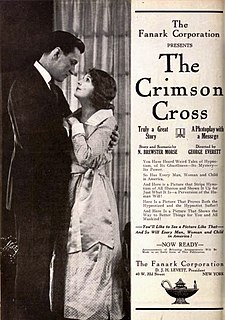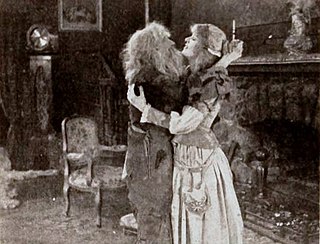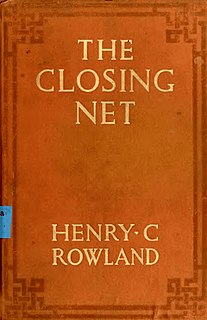Related Research Articles

Pierce Brothers Westwood Village Memorial Park & Mortuary is a cemetery and mortuary located in the Westwood Village area of Los Angeles. It is located at 1218 Glendon Avenue in Westwood, with an entrance from Glendon Avenue.
Arthur Joseph Penty was an English architect and writer on Guild socialism and distributism. He was first a Fabian socialist, and follower of Victorian thinkers William Morris and John Ruskin. He is generally credited with the formulation of a Christian socialist form of the medieval guild, as an alternative basis for economic life.

The New Freedom was Woodrow Wilson's campaign platform in the 1912 presidential election in which he called for limited government, and also refers to the progressive programs enacted by Wilson during his first term as president from 1913 to 1916 while the Democrats controlled Congress. First expressed in his campaign speeches and promises, Wilson later wrote a 1913 book of the same name. In terms of legislation, wartime policies are generally not considered part of the New Freedom. After the 1918 midterm elections. Republicans took control of Congress and were mostly hostile to the New Freedom. As president, Wilson focused on three types of reform:
- Tariff reform: This came through the passage of the Underwood Tariff Act of 1913, which lowered tariffs for the first time since 1857 and went against the protectionist lobby.
- Business reform: This was established through the passage of the Federal Trade Commission Act of 1914, which established the Federal Trade Commission to investigate and halt unfair and illegal business practices by issuing "cease and desist" orders, and the Clayton Antitrust Act.
- Banking reform: This came in 1913 through the creation of the Federal Reserve System and in 1916 through the passage of the Federal Farm Loan Act, which set up Farm Loan Banks to support farmers.

Arthur Housman was an American actor in films during both the silent film era and the Golden Age of Hollywood.

Stanley Earl Nelson Jr. is an American documentary filmmaker and a Macarthur "genius" fellow known as a director, writer and producer of documentaries examining African American history and experiences. He is a recipient of the 2013 National Humanities Medal from President Obama. He has won three Primetime Emmy Awards.

Herbert Blaché was a British-born American film director, producer and screenwriter, born of a French mother. He directed 56 films between 1912 and 1929.

The Motion Picture News was an American film industry trade paper published from 1913 to 1930.
Georges Alphonse Hatot was a theater manager and pioneering french filmmaker during the late 1890s and early twentieth century. He directed the first known film based on the story of Joan of Arc in 1898 as well as having made the first films to feature the Roman emperor Nero. Besides being a director he also wrote the 1908 serial Nick Carter, le roi des détectives which was a major success and spawned many detective series in the following years.

Edward Langford was an actor in American films and theater productions. He was paired in films with Alice Brady.
Albert Sidney Angeles, was a theatre actor and director of silent films. Originally born in London, he worked in the USA as a writer and director for Vitagraph, later directing for Universal.
The New Disciple was a 1921 silent film produced by labor organization the Federal Film Corporation in Seattle. It was the most widely-viewed--over one million viewers in the year of its release--labor film of this period. The film featured Alfred Allen, Norris Johnson, and Pell Trenton. The silent film included titles from Woodrow Wilson's 1913 New Freedom and told the story of a war veteran and a corrupt capitalist war profiteer. Ollie Sellers directed the anti-open shop film which was an indictment of the American plan. Promotions for the film called for union members to "wait" on their film exchanges to show the film. Film production was supervised by John Arthur Nelson who wrote the story which was published at the same time. William Piggott did the screenplay. The film was made in Los Angeles.

Thomas L. Jefferson was an American film and stage actor in mostly silent films.
Barry O'Neil was a film director and writer. His real name was Thomas J. McCarthy. He directed several Thanhouser films including the production company's first two-reeler, Romeo and Juliet. He went on to work for Lubin and then World Film Corporation.

Julia Calhoun was an American actress during the silent film era. She appeared on stage and in comedy films including early ones with Oliver Hardy from at least 1914 on into the 1920s.

Henry Cottrell Rowland was a writer. Several of his works were adapted into films. He was also a co-producer on films. He wrote stories for magazines and novels. Several of his works are illustrated.
Joseph J. Franz was an actor and film director during the silent film era in the United States. Franz was born in Utica, New York. He died in Los Angeles in 1970. He was sometimes credited as Joseph J. Franz. He features in a Frontier advertisement with two of the studio's other stars.
Lawrence B. McGill was a film director. He was brought on as a director at Champion Productions. He also worked for the New York Reliance-Mutual Company.
Charles Neville Buck was an American writer who had many of his novels staged in theater productions and adapted into films during the silent film era. He was born in Woodford County, Kentucky. His father Charles William Buck served U.S. president Grover Cleveland's administration in Peru and wrote Under the Sun about the Inca period. His maternal grandfather was dean of the University of Kentucky Medical School.
Rex Motion Picture Company was an early film production company in the United States. Edwin S. Porter was one of Rex's founders after his shortlived Defender Film Company failed. Rex produced dozens of films from 1910 into 1917. Rex was one of the studios that combined to form Universal Pictures under Carl Laemmle's leadership.
References
- ↑ Ross, Steven J. (September 29, 1999). "Working-class Hollywood: Silent Film and the Shaping of Class in America". Princeton University Press – via Google Books.
- ↑ James, David E. (May 30, 2005). "The Most Typical Avant-Garde: History and Geography of Minor Cinemas in Los Angeles". Univ of California Press – via Google Books.
- ↑ Slide, Anthony (February 25, 2014). "The New Historical Dictionary of the American Film Industry". Routledge – via Google Books.
- ↑ "Reports of cases determined in the district courts". September 29, 1922 – via Google Books.
- ↑ Morris, Oeter (August 6, 1992). "Embattled Shadows: A History of Canadian Cinema, 1895-1939". McGill-Queen's Press - MQUP – via Google Books.
- ↑ Frank, Dana; Dana, Frank (January 28, 1994). "Purchasing Power: Consumer Organizing, Gender, and the Seattle Labor Movement, 1919-1929". Cambridge University Press – via Google Books.
- ↑ https://books.google.com/books?id=7k1rb0XT6TEC&pg=PA344&dq=%22j.+arthur+nelson%22+film&hl=en&sa=X&ved=0ahUKEwjen7GH8PXkAhVyRN8KHdoXAS4Q6AEINzAC#v=onepage&q=%22j.%20arthur%20nelson%22%20film&f=false